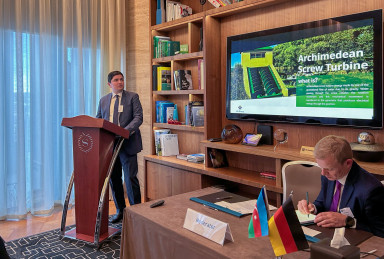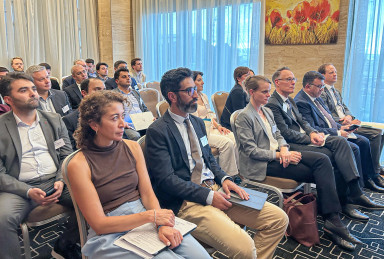The international event “German-Azerbaijani Green Energy Transition,” organized in Baku by the German-Azerbaijani Chamber of Commerce (AHK Azerbaijan), showcased a new stage of energy cooperation between the two countries. The event, held on September 15, 2025, brought together representatives of state institutions and leading energy companies. AS GROUPwas represented by Chief Innovation and Energy Officer and Board Member Ramiz Mammadov.
The event was opened by AHK Azerbaijan’s Executive Director, Nargis Wieck. In her remarks, she underlined the strategic importance of joint initiatives between Germany and Azerbaijan in shaping the green energy agenda of the future. She particularly emphasized the role of young people newly joining the cooperation, noting that their knowledge and initiatives are the key to the sustainable development of the partnership. Afterwards, the floor was given to Deputy Minister of Economy of the Republic of Azerbaijan, Samad Bashirli. The Deputy Minister highlighted the opportunities for expanding economic cooperation in the field of green energy and stressed the strategic importance of joint projects in this direction.
In his speech, Ramiz Mammadov presented the project “Smart Village Aghali – Azerbaijan-Germany cooperation in sustainable hydropower.” According to him, this initiative is not just an energy project, but an example that combines the synergy, mutual strengths, and strategic vision of the two countries. On the Azerbaijani side, AS GROUPdemonstrated strong commitment to regional development, the return of internally displaced persons, and the reconstruction of infrastructure. On the German side, Rehart GmbH, a company operating since 1938, contributed its long-term engineering expertise and technological solutions.
At the heart of the project lies the renowned German technology – Archimedean screw turbines. This system merges an ancient mechanical principle with modern innovation to generate clean and sustainable electricity. R.Mammadov underlined that the advantages of these turbines are manifold: they efficiently convert up to 80% of water flow into electricity, can operate continuously for up to 8,000 hours per year ensuring reliable power supply, and provide durability with a lifespan exceeding 40 years. Most importantly, they are in ecological harmony — completely safe for fish, improve water quality, operate silently, and do not harm the nature of Zangilan.
The “Smart Village Aghali” is not only a technical achievement but also the realization of a social and environmental vision. Thanks to clean energy, the village will feature modern housing, educational and digital infrastructure, as well as smart water and agricultural systems. This model proves that traditional rural life can be integrated with modern technologies, and that sustainable development is a realistic path for the region’s future.
According to R.Mammadov, the project stands as a successful example of Azerbaijan-Germany cooperation. It contributes to reducing carbon emissions, strengthening energy security, and improving social welfare by providing new living conditions for the village’s first residents.
Concluding his remarks, R.Mammadov stated: “We are not just building a power plant. We are lighting up the future. This project demonstrates what international partnership, shared vision, and complementary strengths can achieve.”
Thus, the “Smart Village Aghali” project is presented as a roadmap for sustainable development not only for Azerbaijan but for the entire region. Azerbaijan-Germany cooperation lays the foundation for more confident steps in the green energy transition.
The event continued with speeches focusing on innovation, renewable energy, and efficiency in Azerbaijan’s energy transformation to promote sustainable development.

-2-md.jpg)
-2-sm.jpg)

